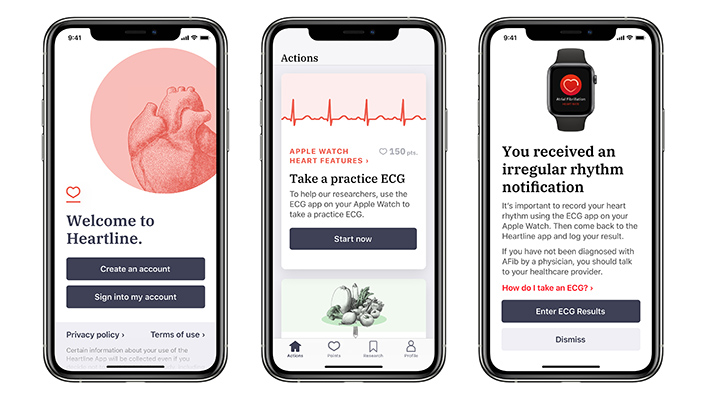
Apple and Johnson & Johnson announced this morning the launch of their new digital health study exploring the impact of Apple’s devices and a study-specific engagement program on cardiovascular outcomes among the Medicare population.
First announced in early 2019, the Heartline Study — which also names Evidation Health as a collaborator — is now enrolling seniors aged 65 years or older who are on traditional Medicare, and also own an iPhone 6s or later smartphone. These participants, the companies say, can sign up for the study remotely by downloading the Heartline Study app and releasing access to their personal Medicare data.
“Through this important collaboration with Apple, we are pioneering new models that we hope can break down some of the most common barriers to participation in clinical studies,” Dr. Paul Burton, VP of medical affairs for internal medicine at Janssen Scientific Affairs, said in a statement. “Our work continues to develop and deliver solutions for those impacted by [atrial fibrillation] in the areas of detection, treatment and care, through novel approaches, so that we can potentially improve their lives today and well into the future.”
Enrolled seniors will be randomly assigned to two study groups. The first of these will only be using their iPhone and the Heartline Study app, which is designed to engage users with weekly health education, tips, surveys and questionnaires. A second group will also be provided with an Apple Watch so that they may incorporate the device’s on-board ECG and irregular rhythm notification feature into their personal health monitoring.
The Heartline Study will consist of two years of “active engagement,” and an additional year of follow-on data collection. Through this period, the companies said they will be looking for any changes in stroke risk and atrial fibrillation detection among the study population.
WHY IT MATTERS
App-based digital health studies like these enjoy higher rates of enrollment and lower overhead costs. Recently published study data, however, suggest that such designs are also subject to greater turnover and predominantly younger samples.
Heartline, however, will be enrolling a much older cohort that is generally much more conscious of their health conditions. As such, this effort will be noteworthy in multiple regards: as an exploration of how a digital program and Apple’s consumer devices and features can engage users and improve their health; and as a look at whether this type of decentralized study design will find an audience among seniors.
“Heartline is a study that has the potential to fundamentally change our understanding of how digital health tools, like the ECG app and irregular rhythm notification feature on Apple Watch, could lead to earlier detection of [atrial fibrillation], helping patients understand and directly engage in their heart health, prompting potentially life-saving conversations with their doctors, and improving health outcomes,” Dr. C Michael Gibson, founder of the PERFUSE academic research organization at Beth Israel Deaconess and co-chair of the Heartline Executive Committee, said in a statement.
THE LARGER TREND
Apple CEO Tim Cook has long been vocal in his belief that Apple will soon be a major player within healthcare, and so far the company’s devices have already been featured in a handful of wellness programs from UnitedHealthcare, Vitality Group and others.
But the company has also gone big on clinical research partnerships over the past few years. It kicked off the Apple Heart Study with Stanford back in 2017, and announced those results early in 2019. Since then the company announced and launched three more studies also employing the Apple Watch’s various health tracking features, which consumers can enroll in by downloading the company’s Research app.
ON THE RECORD
“Apple technology is making a meaningful impact on scientific research through the powerful capabilities of iPhone and Apple Watch, all with privacy at the center of the participant experience,” Myoung Cha, Apple's head of health strategic initiatives, said in a statement. “The Heartline Study will help further understanding of how our technology could both contribute to science and help improve health outcomes, including reducing the risk of stroke.”

















